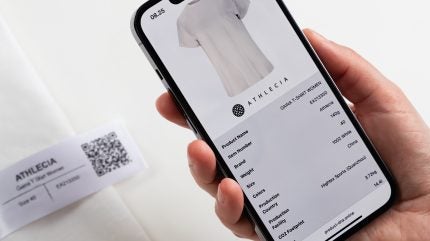
Sports Group Denmark and Trimco Group are piloting the practical rollout of Digital Product Passports (DPP), a central element of the European Union’s upcoming Eco Design for Sustainable Products Regulation (ESPR).
The collaboration aims to strengthen traceability, transparency and data management across the apparel supply chain.

Discover B2B Marketing That Performs
Combine business intelligence and editorial excellence to reach engaged professionals across 36 leading media platforms.
The initiative builds on shared insights from Data til Business, an EU-funded Interreg project led by the Lifestyle & Design Cluster alongside other Nordic partners.
The first pilot phase created a DPP trial label for three product styles, manually compiling data from different systems to test interoperability between Trimco’s platform and the brand’s existing tools. The next phase will expand the initiative using Trimco’s ProductDNA platform, integrating its Certificate Manager and Product and Digital Manager tools to scale and systematise DPP adoption across teams.
During the project, Sports Group Denmark identified three main lessons:
- Data in the Supply Chain: Improved ability to locate, connect, and verify data across multiple production tiers
- System Integration: Enhanced connectivity between existing platforms to create a more transparent and usable flow of information
- Strategic Use of DPPs: Understanding how DPPs can provide value in a market increasingly focused on sustainability and ethical practices.
Trimco Group sustainability and compliance director Camilla Mjelde said integrating digital data with physical products is “becoming a critical step for brands to navigate regulatory requirements and build trust with their customers.”

US Tariffs are shifting - will you react or anticipate?
Don’t let policy changes catch you off guard. Stay proactive with real-time data and expert analysis.
By GlobalDataShe added that the partnership “demonstrates how supply chain collaborations can address the data challenges posed by ESPR and DPP requirements.”
Sports Group Denmark chief sustainability officer Kristina Vigen explained the project shows how data can support compliance and create commercial value. “Our customers increasingly demand access to reliable product data, and pilot projects like this strengthen our competitiveness while preparing us for future ESPR requirements,” she said.
A consumer survey conducted during the project found that end-users place the highest importance on information about working conditions at production sites, underscoring how transparency supports both compliance and customer trust.
Danish Lifestyle & Design Cluster’s head of digital Heidi Svane Pedersen said: “Data is not just about compliance – it is about enabling companies to future-proof their business models, create value in the green transition, and position the Nordics as frontrunners in transparency and innovation.”
The pilot was presented at the final Data til Business event at the Textile Museum in Borås, Sweden alongside initiatives from 21 other textile brands.





